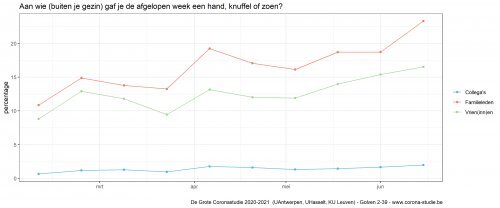We shake hands or give a kiss more often
June 15th 2021
Participants in the Great Corona Study follow the UEFA European Football Championship mostly in their own bubble
Good weather, increasing vaccination coverage, steeply declining corona numbers: it’s not entirely unexpected that more and more respondents of the Big Corona Study say they have shaken hands or kissed someone outside their household. Participants are still cautious: a large majority follows the UEFA European Football Championship in a limited social circle.
The Great Corona Study, an initiative of UAntwerp, in cooperation with UHasselt, KU Leuven, ULB and supported by a financial boost from the Research Foundation Flanders (FWO), saw its 39th edition on Tuesday 15 June. The biweekly questionnaire was completed just under 15,000 times.
‘Fewer participants find their way to our survey’, Prof. Philippe Beutels (UAntwerp), one of the initiators, says. ‘The great weather and the approaching “realm of freedom” obviously play a role. But still, we hope that as many people as possible will share their experiences and opinions with us in this citizen science project. We can still learn a lot from the information of the 15,000 people who responded this time.’
Some initial findings:
People clearly shake hands and give a kiss more often. Two weeks ago, 33% of respondents said they had shaken hands or kissed someone recently, this week it is 39%. The groups that have the most physical interactions are fully vaccinated people, young people and participants who indicate that they are unlikely to get vaccinated.

- Physical interactions with friends and family are mainly on the rise. Colleagues are mostly kept at a distance: only 2% shook hands with, kissed or hugged a colleague.
- This makes sense: the number of participants who say they exclusively worked from home fell from 37.7% to 32.7%. This, of course, has everything to do with the ‘return day’: 6% said they had used it.
The Great Corona Study also polled the way in which Belgians follow the UEFA European Football Championship. 77% of respondents who follow the championship say they do so exclusively with members of their own household. 23% seek the company of people outside their household to watch the matches.
Parties with up to fifty guests are allowed once again. People have many birthdays and other occasions to catch up on. 8% of respondents said they would go to at least one big party with about fifty people before 1 August. Especially young adults between the ages of 18 and 35, unvaccinated people and those who do not intend to get vaccinated intend to go to such parties.
Another current topic is the reduced vaccination time between the first and second dose of the AstraZeneca vaccine. Due to having underlying conditions, a large group of vaccinated people received their first dose of the AZ vaccine in May, but it will take twelve weeks to receive their second dose (i.e. in August, well after their healthier peers have already been fully vaccinated with one of the other vaccines). Being fully vaccinated is important in light of the advancing delta variant, which first appeared in India. Just over half of participants who belong to this more vulnerable target group said they would be more willing to receive their second dose of AZ if it were offered after eight weeks instead of twelve. 1% would prefer a twelve-week interval, while 45% say that the eight-week or twelve-week interval does not affect their willingness to get vaccinated. Given that the efficacy of the AZ vaccine is similar when the second dose is given after eight or twelve weeks, a lower complete vaccination rate of this group in the second half of summer is obviously to be avoided.